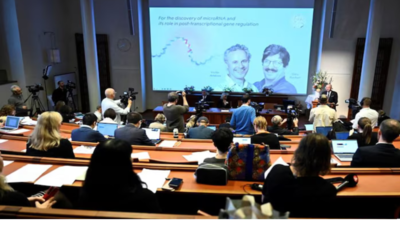
One complicating factor has been that microRNAs can be unstable
Victor Ambros
and
Gary Ruvkun
, the latest Nobel Prize winners in medicine, have been recognized for their groundbreaking discovery of
microRNA
in human DNA.
This genetic switch, capable of turning gene functions on or off, holds immense potential for treating various diseases, including cancer, heart ailments, and viral infections.
Despite the scientists initially considering their findings as merely "something weird about worms," according to
Cambridge University
geneticist
Eric Miska
, the implications of their work have far-reaching consequences.
How does the genetic switch work
Miska gave the example of the messenger RNA vaccines rolled out against COVID-19 during the pandemic, which inserts a message with new instructions to build proteins that block viruses.
But the two new Nobel winners Ambros and Ruvkun discovered a new type of gene regulator previously overlooked by science.
Rather than being the messenger which relays information, microRNA instead acts as a switch to turn other genes off and on.
"This was a whole new level of control that we had totally missed," said Miska, who has worked on microRNA for two decades, including with the new Nobel laureates.
"The discovery of microRNAs brought an additional level of complexity by revealing that regions that were thought to be non-coding play a role in
gene regulation
," French researcher Benoit Ballester told AFP.
What is microRNA?
Each cell in the human body has the same set of instructions, called DNA. Some turn into brain cells, while others become muscles.
MicroRNAs are particularly promising for fighting cancer because some of these switches "act as a tumour suppressor, so they put a brake on cells dividing inappropriately," Miska said.
Others, meanwhile, induce "cells to divide, which can lead to cancer", he added.
So how do the cells know what to become?
The relevant part of the DNA's instructions is pointed to via a process called gene regulation.
Ribonucleic acid (RNA) normally serves as a messenger. It delivers the instructions from the DNA to proteins, which are the building blocks of life that turn cells into brains -- or muscles, AFP reported

 9 months ago
236
9 months ago
236




























 English (US)
English (US)